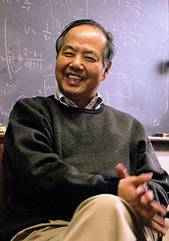Li Zhengdao
Li Zhengdao (also Tsung-Dao Lee ) (Chinese: 李政道) was born in Shanghai on Nov. 25, 1926. He conducted modern physics research with physicist Wu Dayou at Southwest Associated University in Kunming in 1945. He then went abroad and studied at the University of Chicago in 1946. After receiving his doctor's degree in 1950, he worked at the University of California, Berkeley, and then later at Princeton University. In 1953, he moved to Columbia University and became the first professor teaching Fermi's physics theories at the university in 1964.
In 1957, Li and his collaborator Yang Chen Ning won the Nobel Prize in Physics for their work on the violation of parity law in weak interaction, which Wu Chien-Shiung experimentally verified.
Li has assisted the Chinese Academy of Sciences (CAS) in building their electron-positron collider and synchronized radiation facility. In 1980, he called on dozens of universities in America to recruit Chinese graduate students majoring in physics.
